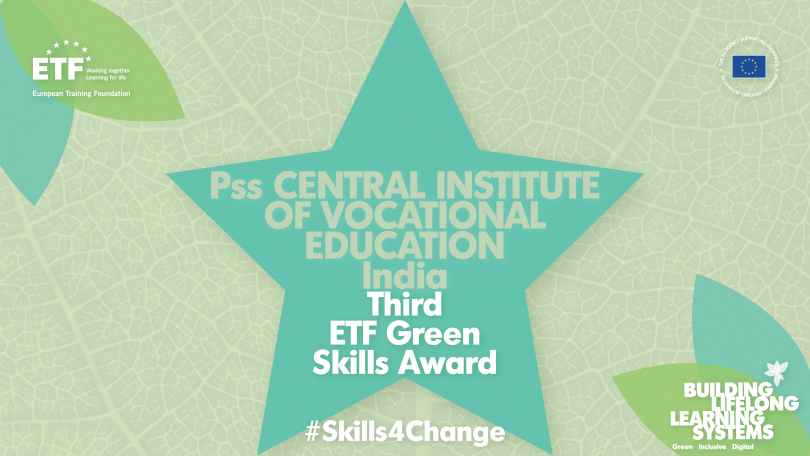
India: Rediscovering the Green Skills Award Finalists
Interview with Rajesh Khambayat, Joint Director of Pandit Sundarlal Sharma Central Institute of Vocational Education (PSSCIVE), Bhopal, India
India's Pandit Sundarlal Sharma Central Institute of Vocational Education (PSSCIVE) nearly did not make it into the final round of the ETF's Green Skills Awards. Not because it did not qualify, but because the institute's Joint Director, Rajesh Khambayat, who had submitted the application to compete, had contracted COVID-19.
Luckily, Rajesh was on the mend and able to check his inbox, which had an email notifying him that PSSCIVE was in the final 11. "I asked for the deadline to submit more information to be extended as I was still recovering in hospital. It makes me very happy to be a finalist," he says.
The PSSCIVE, spread over a 35-hectare campus in Bhopal, known as the City of Lakes and one of the greenest conurbations in India, is the country's most important vocational education and training (VET) institute, tasked with assisting and advising the central and state governments in improving the vocational education system.
The work it is doing impacts some 1.2 million students, says Rajesh. The PSSCIVE has taken on such a vital role, as it is the only institution focused on vocational education in schools, despite India's population size, of 1.3 billion.
Rajesh has a diverse background, having been in TVET for three decades as well as having worked as consultant for international organizations such as Colombo Plan Staff College in, Manila, Philippines, the Asian Development Bank, UNESCO, and UNESCO-UNEVOC. In 2014, he was a Fulbright scholar.
For the last four years, Rajesh has headed the institute. He has played a central role in improving the curricula of vocational courses by introducing employability skills (communication, ICT, self-management, entrepreneurial and green skills), including designing a one-year diploma in VET for distance learners.
With vocational education not considered as important as conventional graduate education until a few years ago, there has been a pressing need to revitalise India's VET courses and teacher preparation through exposure to vocational pedagogy, including learning outcome-based curricula and digitalization of VET. By 2025, India is aiming for 50 percent of learners to be exposed to vocational education.
With India committed to the United Nations' Sustainable Development Goals (SDGs), and sustainability being increasingly important at the policy level, VET needs to incorporate green skills.
"India is at a crossroads. On the one side, economic growth, but how can we achieve this while protecting the environment and sustainability? That is why I strongly believe we need a new way of thinking, and a new methodology of teaching for the future," says Rajesh.
PSSCIVE has taken two major initiatives, the first green skills embedded in VET, and secondly, the greening of the institute itself.
"VET is developing a significant number of workforce that will create, re-create and transform natural resources with environmental obligations," says Rajesh.
Drawing from best practices worldwide, the institute is working to implement green skills across all vocational curricula through its six major departments and centres. With green occupations expected to significantly increase in India, with the possibility for providing major employment opportunities, "students want to know about the new green jobs that are emerging," says Rajesh.
Utilising UNESCO-UNEVOC's framework for greening TVET institutions, PSSCIVE has adopted five major components – a green campus; a green curriculum and training; green communities; green research; and green culture. The institute has adopted a holistic approach to greening its campus, from the use of water and waste generated, to installing solar panels and banning plastic. "We have to practice what we preach – and that includes teachers," says Rajesh. "Teachers need to be equipped with skills and right mindset for greening, or else nothing will happen."
To implement the greening TVET initiative, Rajesh brought all the institution's employees together to discuss what the institution is doing and the role everyone has to play. "We asked what issues we are facing address the growing environmental challenges, and what can be done at the institute level for sustainability. It is important to solve problems together as we can have different ideas," says Rajesh.
He wants the PSSCIVE to be a role model for the VET institutions in the country. "We have visitors from all across India and beyond the region, so the students and people visiting should see us as a role model, as a green institution. We want to convey the passion about our ideas," he says.
PSSCIVE's idea of ‘Catch them Young’ by introducing students with green skills through VET courses will have positive impact on achieving the goal of sustainability. Green skills are embedded in 152 job roles for 17 priority sectors such as construction, automotive, ITeS, apparel, retail, media & entertainment, health, travel & tourism, and agriculture, with textbooks and digital resources being developed by the institute.
"We are covering all the primary sectors of the Indian economy as there is huge potential for growth and employment once all these efforts are well-aligned and structured," he says.
While 1.2 million students have been exposed to green skills, the plan is to reach 10 million students with VET and green skills within the next few years. "Our focus is on the expansion of quality VET education into our schools," says Rajesh.
Did you like this article? If you would like to be notified when new content like this is published, subscribe to receive our email alerts.